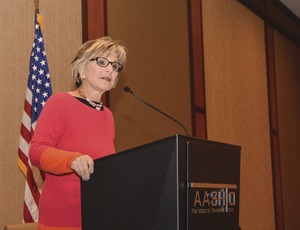

State transportation departments are busy carrying out 2012's Moving Ahead for Progress in the 21st Century Act and gearing up for the next highway-transit bill. They hope it will become law before MAP-21 expires on Sept. 30, 2014, but funding the program will be a problem.
At the American Association of State Highway and Transportation Officials annual winter meeting in Washington, D.C., from Feb. 27 to March 1, federal transportation officials outlined proposed regulations to carry out MAP-21's big policy changes. If regs to speed environmental reviews track MAP-21, "that's going to be good news for moving projects," says Frederick "Bud" Wright, AASHTO's new executive director. U.S. DOT published on Feb. 28 a proposed MAP-21 rule that would grant more projects "categorical exclusions" from National Environmental Policy Act reviews.
MAP-21 mandates national yardsticks for project performance. Federal Highway Administration chief Victor Mendez said a proposed safety performance standard should be out by Sept. 30, followed by standards for infrastructure conditions in the fourth quarter and congestion, freight movement and system performance in early 2014.
"The performance measures are huge for us," says Michigan DOT's director, Kirk Steudle. Michigan and other states now grade projects. He says, "I think what MAP-21 did was to raise the bar and say, 'Let's make sure we're doing this collectively … and in similar formats.' " California DOT Director Malcolm Dougherty adds, "It'll be very important, nationally, to set the same performance metrics for everybody so we can measure whether states are being effective with the [federal] funding."
Rhode Island DOT's director, Michael Lewis, says implementing MAP-21 is key but adds, "Nobody can take a rest because [MAP-21 is] going to be out of funding in just about 18 months." The Highway Trust Fund highway account is projected to drop into the red about that time.
States operated under stopgap measures for 33 months before MAP-21, and they don't want a repeat. "They've got scar tissue," says South Carolina DOT Secretary Robert St. Onge Jr.
Senate Environment and Public Works Committee Chairman Barbara Boxer (D-Calif.) said, "Now we are really at the moment of truth. We have got to find a source of funding for that trust fund that makes sense." She has met with Bill Shuster (R-Pa.), chairman of the House transportation committee, about the next bill. Shuster said,"I believe we are at a tipping point. We need to figure out how we move forward to be able to fund [the bill] at necessary levels but also continue to build on those reforms in MAP-21, so we can do more with less, if necessary."

